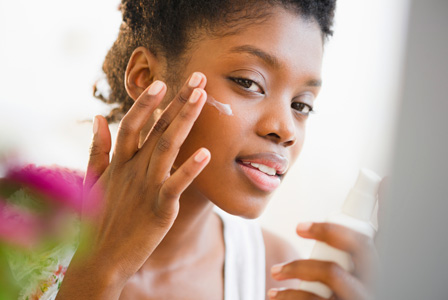
If you haven’t already, it’s time to introduce your skin to vitamin Q, or CoQ10, a powerful weapon in the fight against aging.
Get to know vitamin Q
Vitamin Q and your skin
CoQ10 (also known as vitamin Q) not only makes skin look younger, it resets the biologic clock, says Dr. Michael Taylor, dermatologist and founder of Brightwater Bay Science. "It is a potent antioxidant, quenching the damaging free radicals created by ultraviolet light that are the major factor causing photoaging, as it regenerates new, therefore younger cells," he explains.
Why we need it
CoQ10 is found naturally in every cell of our bodies, but it doesn’t last forever. Stress and aging contribute to the decline in CoQ10 levels, says Taylor and this resulting decline in our ability to regenerate new cells results in skin losing its youthful glow and looking older. "Couple this with the decline in antioxidant function, and a decline in the ability to neutralize the free radicals caused by ultraviolet light, and the skin cells' ability to remain young is compromised," he explains. The result: older-looking skin.
Vitamin Q to the rescue. Since CoQ10 is a lipid-soluble antioxidant, it’s able to penetrate deeper into the skin, into the dermis, which Taylor explains has a direct effect on collagen regeneration.
What vitamin Q can do for you
Regular use of a product with CoQ10 can provide antioxidants that protect the skin from further damage. "The effective boost in cellular regeneration restores not only the epidermis, but the deeper collagen layers," says Taylor. But regular use is key. It takes three months of daily use to get any visible effects of an anti-aging ingredient in topical products. "We know that the normal levels of CoQ10 decline in every cell with normal aging. Therefore, to maintain the benefits, daily use is necessary."
Taylor will be launching a skin care product this spring, Ocean Elements Sheer Daily Moisture SPF 30™ which contains CoQ10 and tells us that in 1999, German scientists demonstrated that "crow’s feet" were significantly improved after using topical CoQ10 for three months.
What to look for when you shop
If you want to add vitamin Q to your skin care routine, there are other names for the ingredient that include "ubiquinol" or "ubidecarenone," so Taylor advises looking for those on the label. Unfortunately, he adds that there is no way to know from the ingredient list what concentration of CoQ10 is in the product, although he notes that the manufacturer could make that available on the website.
In general, Taylor explains that it’s best to look for a skin care, anti-aging product that contains several antioxidants that work by different mechanisms, and at least one water- as well as one lipid-soluble antioxidant. "Otherwise, single antioxidant ingredients are used up in the process of quenching the free radicals, becoming free radicals themselves," he explains. "But with multiple antioxidants, the antioxidant power is sustained by recycling of active antioxidants."
More beauty tips
Debunking oil pulling: What it actually does
5 Tips for radiant skin
Vitamins that boost natural beauty